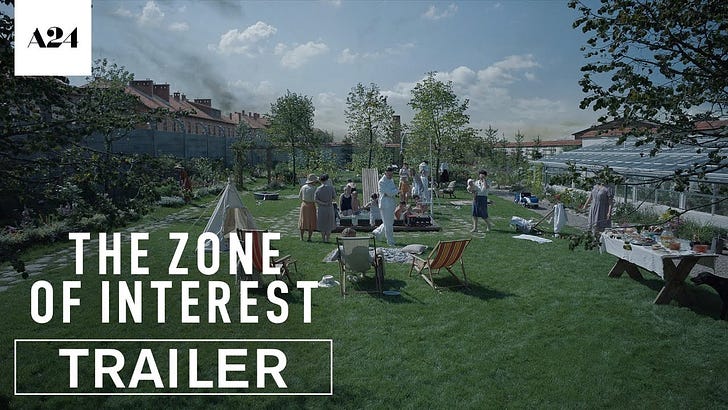As I mentioned last month, the City of Toronto is working on an action plan on arts and culture and asking for input. Fill out the survey here. There are some open-ended questions so I did manage to sneak in “freedom of expression” as one of the pressing issues affecting artists working in Toronto today. Make the most of it even though I’m not sure if anyone will be listening. There’s also a virtual town hall coming up on Feb 22.
There is a qualitative difference between video art made for cinema theatres and home screening (aka film) and video art made to be watched in galleries and contemporary art museums. Jonathan Glazer-directed, Oscar-nominated, far removed from the eponymous Martin Amis novel, The Zone of Interest is essentially high prestige video art that got movie distribution. Critics are falling over themselves to show appreciation and sure, it’s a film that gives critics a lot of room to show how smart and serious they are and to use the “banality of evil” phrase and such. But The Zone of Interest, while chilling, philosophical, and a serious mediation on human beastliness, is not exactly a feature film in the traditional sense. Perhaps it’s a short extended to a feature? You’ve probably read the synopsis by now: the commandant of Auschwitz, Rudolf Höss, and his wife, Hedwig, live right next to the Auschwitz walls. That’s it, that’s the film.
The time that passes in the film is filled with daily activities, visitors, housekeeping. The wife (Sandra Hüller of Anatomy of a Fall) is very proud of her new home and large gardens and orchards; it’s everything she’s ever dreamed of, so when Höss announces that he is about to be transferred, she’s unhappy and insists on staying put with her kids, because this is home. She can’t just up and leave everything they’ve worked so hard to build. The chimneys spewing smoke 24/7, the odd noises from the other side of the wall, the occasional unfortunate spillage of ashes into the bucolic river? Minor inconveniences. Hedwig finally got hold of the real estate that is her due in the expanding Lebensraum and she’s not giving it away to some new camp director’s family itching to replace them. You can’t expect her to return to a life in an apartment building in Berlin.
How do people become beastly indifferent to other people’s suffering? Compartmentalize the uncompartmentalizeable? In a vast majority of cases it’s as banal as careerism, mortgage, providing comfortable life to one’s children. Me and mine first. Glazer’s film makes this point starkly - already in the first 15 min. After that, not much is added. It’s 1h45min of dutiful homemaking and utter indifference to everything that falls outside it.
To improve my impression of the recent Oscar-nominated German cinema, I went to see The Teachers’ Lounge. I returned home in an even bigger huff.
The film does something I don’t think I have experienced before: it brings the intrigue to a boiling point, and then just… stops. How is this dereliction of duty acceptable? Who actually stole the money from the teachers’ lounge? Is Frau Kuhn innocent? Is the kid from the Turkish immigrant family wrongly accused while being the purest of the pure? And what’s up with Oskar? What is the meaning of that hug? You will be given not a single answer before the end credits. The point was to show what a mess well-meaning people can make, and how fast? OK, thanks bud.
Look, I have nothing against good agit-prop, if it’s for the right cause and if it’s, crucially, good. Some agit-prop is so good, it’s become part of the western canon - see Bertold Brecht-Kurt Weill’s The Threepenny Opera, the Liberty tutti in Mozart’s Don Giovanni, “Va, pensiero” sung by the chorus of the Hebrew slaves standing in for Italians under the occupiers’ yoke in Verdi’s Nabucco.
And I enjoyed Mouthpiece, the Quote Unquote Collective’s earlier effort, which toured everywhere to accolades and ended up being a very good Patricia Rozema movie. Amy Nostbakken and Nora Sadava are talented theatre artists.
So it’s a huge surprise that Universal Childcare, a piece of political cabaret raising awareness about the lack of accessible childcare in some of the wealthiest countries of the G7 that recently opened at Canadian Stage’s Berkeley Street Theatre, turned out to be an undercooked mess.
Four young families (a single Japanese woman; a lez couple in London, UK; an African-American pair; and a Toronto pair) tell very believable stories of hardship around finding affordable childcare. Stats are projected onto the set. Songs are sung, mostly a capella with soundscape support from other actors. And none of it is very good. Not the music, not the lyrics, not the singing, not the preachy MC-ing, and not the experience of it all as a piece of theatre. Nostbakken wrote the music, but why not hire a composer or cabaret song writer? If music is the core of your play, why not have someone who’s created some music before? And why not cast people who can sing? (About three of the 8 cast members can actually carry a tune; Anika Venkatesh particularly beautifully.)
Canada (and here they mean the ROC - Quebec’s affordable childcare is simply ignored), UK, US and Japan are four very different countries, each with its own reasons behind the inadequately state-funded childcare. The US, as one of the video projections reminds us, doesn’t even have paid maternity leave. Japan is an extraordinarily patriarchal and closed to immigration society and in this has very little in common with the anglosphere. The bits and flotsam of history of socialized childcare and resistance to it from each of the four countries doesn’t make a structure and doesn’t make a through-story.
In between the singing numbers, we hear the characters explain themselves as if giving interviews to reporters or documentarians - or perhaps talking frankly with a friend over coffee. Political cliches, I’m afraid, abound. “We are a London-based queer mixed race couple with an interracial child, imagine if we end up in some Brexit-y village in the middle of nowhere”—did this not strike anyone involved as arrogant elitist bs? There’s an entire bellyaching segment around said couple, who would like to have another child, realizing they would have to move out of London. 26 percent of all moves in the UK are for the reasons of unaffordable childcare, informs us the projection, and if at this point you feel you have to work on your compassion, I won’t blame you. “Brexit-voting nowhere”!
The play is slightly out of tune too on its socio-economic analysis: the majority of principal characters seem to be working artists. Artistic careers, with their demands, fluctuations, feast or famine, continuous professional development and travel, and juggling parallel anchor jobs, are not typical careers in any of the four countries. Not that focusing on how artists can juggle parenting and their art wouldn’t make for a fascinating play; it absolutely would. But choosing an artistic career over a 9-5 means consciously choosing in the direction of freedom over security and comfort. Parenting and childcare are inevitably more complicated under those conditions. Being shocked by that is - sorry, a little silly. And not everyone lives in a huge city, though the artists trying to make it will probably have to. If Universal Childcare was about creatives trying to figure out the economics of parenting - and if we put them in the same country; why not this very one - it would actually cohere.
The MC/Mexican nanny character/standup comic Monica Garrido is tasked with providing both comic relief and sans-papiers labour poignancy, but the lines she is given in her final act, in which she describes herself as a “queer immigrant woman of colour” jar in their untruthfulness. Who in their heart of hearts refers to themselves in those terms? (As a sidenote. I’ve interviewed Monica once, who told me that she comes from a middle class family in Mexico and as a Mexican in Mexico did not use to think of herself as “a person of colour”. It’s a Canadian/American term which she’s learned to embrace.)
It’s back to the writing room, if this play is to become anything lasting.
Self-promotion zone: I was a guest on Julie Bindel and Kathleen Stock’s podcast, The Lesbian Project pod. We talked western Balkans, Albanian Sworn Virgins, deciding not to come out, the “LGBTQ” advocacy in authoritarian countries, then took a detour to opera, trouser roles, mezzo fandom, and ended on the evergreen topic, what the hell is happening to Canada.
Coming up on Long Play: a conversation with Montreal-based researcher and graduate student Eliza Mondegreen (not her real name!) who spends a lot of time in the online gender-fantasyland trenches so we don’t have to. She always has interesting things to say and can spot new developments way before they make it to gender mainstream.



